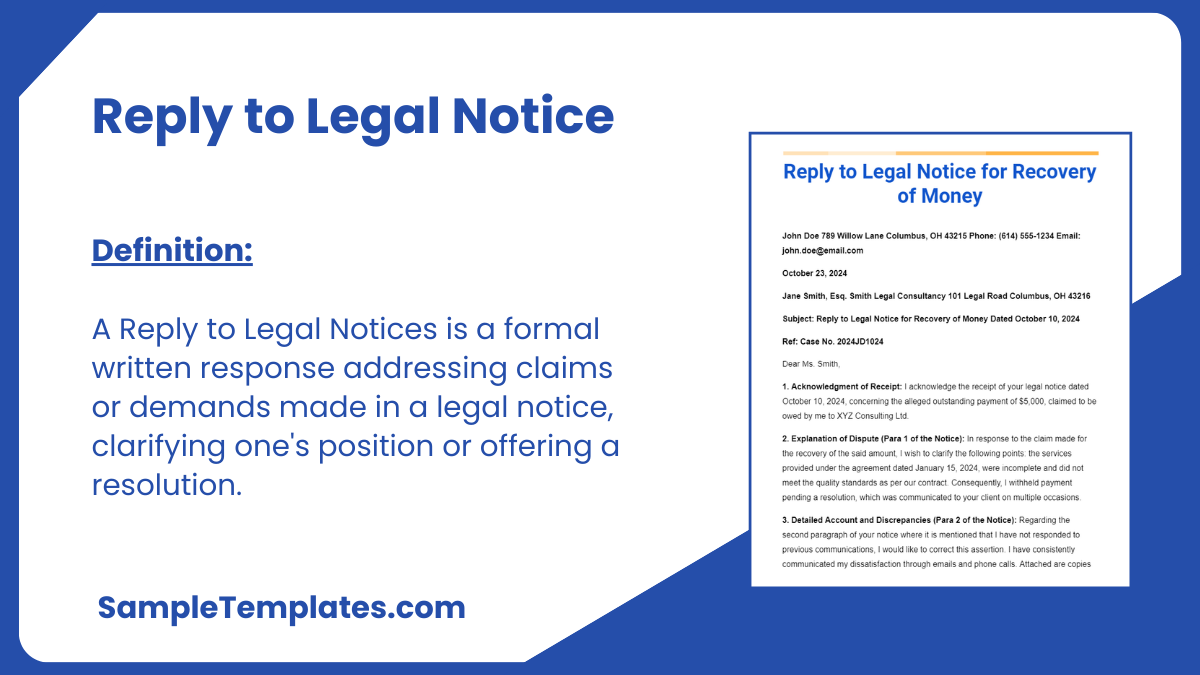Imagine waking up one morning to the chirping of birds, the fresh scent of spring, and a ring on your doorbell. You blissfully get out of bed, thinking that it’s going to be a great day. As you put on your indoor slippers and head out, you expect to open your door to the daily news or a case of fresh milk; however, what you find is a complaint letter addressed to you. Your heart starts pounding since you have no idea what you’re accused of, but you also know that if you ignore it, things will get more complicated, so what do you do? You counter-fire with a reply to the legal notice.
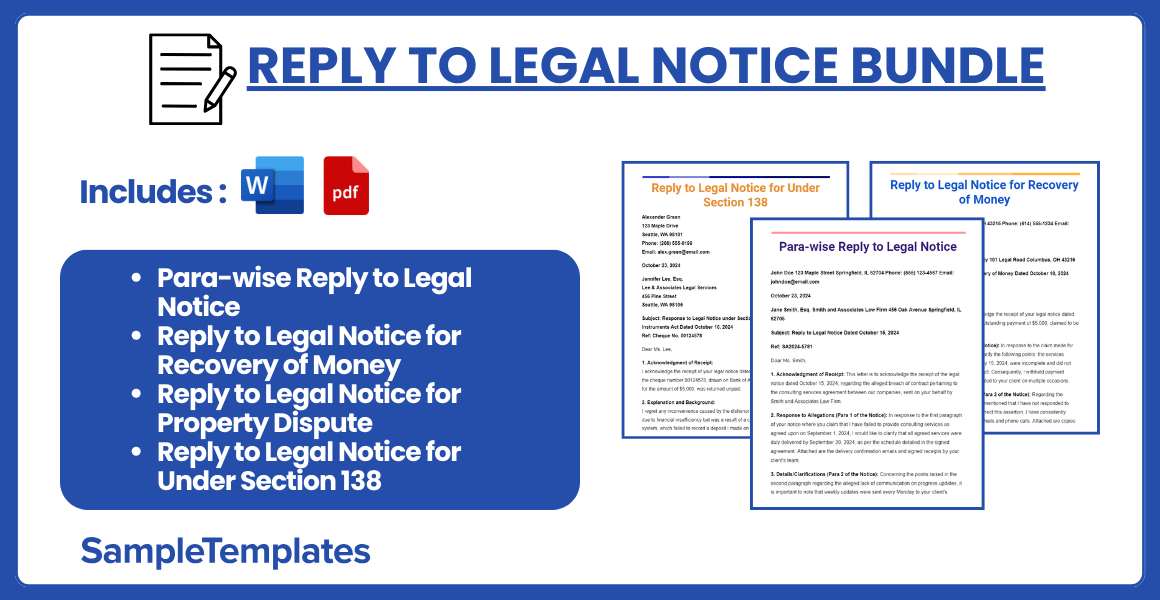
Download Reply to Legal Notice Bundle
Para-wise Reply to Legal Notice
John Doe 123 Maple Street Springfield, IL 62704 Phone: (555) 123-4567 Email: [email protected]
October 23, 2024
Jane Smith, Esq. Smith and Associates Law Firm 456 Oak Avenue Springfield, IL 62705
Subject: Reply to Legal Notice Dated October 15, 2024
Ref: SA2024-5781
Dear Ms. Smith,
1. Acknowledgment of Receipt: This letter is to acknowledge the receipt of the legal notice dated October 15, 2024, regarding the alleged breach of contract pertaining to the consulting services agreement between our companies, sent on your behalf by Smith and Associates Law Firm.
2. Response to Allegations (Para 1 of the Notice): In response to the first paragraph of your notice where you claim that I have failed to provide consulting services as agreed upon on September 1, 2024, I would like to clarify that all agreed services were duly delivered by September 20, 2024, as per the schedule detailed in the signed agreement. Attached are the delivery confirmation emails and signed receipts by your client’s team.
3. Details/Clarifications (Para 2 of the Notice): Concerning the points raised in the second paragraph regarding the alleged lack of communication on progress updates, it is important to note that weekly updates were sent every Monday to your client’s designated contact, Mr. Adam Black. Please find attached copies of these update emails dated September 5, 12, and 19, 2024.
4. Counter Arguments (Para 3 of the Notice): As to your assertions mentioned in the third paragraph about non-compliance with the contract’s confidentiality clause, I contest these claims on the grounds that no confidential information has been disclosed. I have adhered strictly to all contractual obligations, as can be demonstrated with the attached non-disclosure agreement compliance forms signed on each date of service provision.
5. Conclusion and Proposed Solution: In conclusion, while I respect your legal perspectives, it is my position that the services were provided in complete alignment with our agreement. I propose that we aim to resolve this matter amicably through a meeting or mediation, avoiding unnecessary litigation which would be not only costly but also time-consuming for both parties involved.
6. Closing Remarks: Please advise your client accordingly and inform me of your preferred dates for a meeting to discuss this matter further. I am confident that a mutual understanding can be reached with a cooperative approach.
Thank you for your attention to this matter.
Sincerely,
John Doe
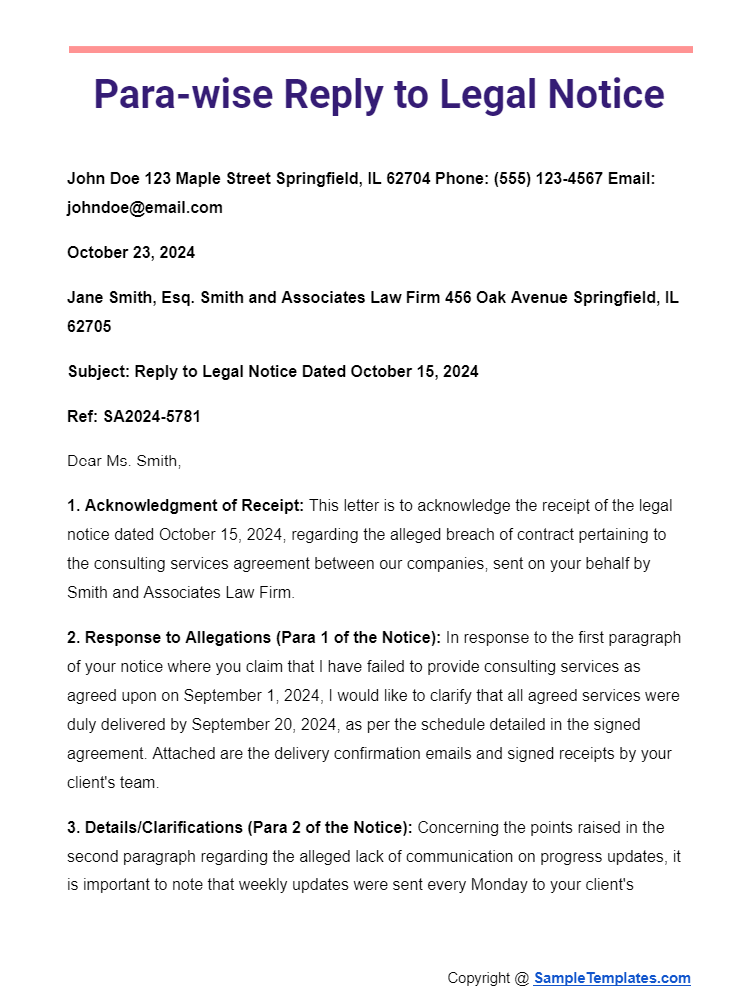
Reply to Legal Notice for Recovery of Money
John Doe 789 Willow Lane Columbus, OH 43215 Phone: (614) 555-1234 Email: [email protected]
October 23, 2024
Jane Smith, Esq. Smith Legal Consultancy 101 Legal Road Columbus, OH 43216
Subject: Reply to Legal Notice for Recovery of Money Dated October 10, 2024
Ref: Case No. 2024JD1024
Dear Ms. Smith,
1. Acknowledgment of Receipt: I acknowledge the receipt of your legal notice dated October 10, 2024, concerning the alleged outstanding payment of $5,000, claimed to be owed by me to XYZ Consulting Ltd.
2. Explanation of Dispute (Para 1 of the Notice): In response to the claim made for the recovery of the said amount, I wish to clarify the following points: the services provided under the agreement dated January 15, 2024, were incomplete and did not meet the quality standards as per our contract. Consequently, I withheld payment pending a resolution, which was communicated to your client on multiple occasions.
3. Detailed Account and Discrepancies (Para 2 of the Notice): Regarding the second paragraph of your notice where it is mentioned that I have not responded to previous communications, I would like to correct this assertion. I have consistently communicated my dissatisfaction through emails and phone calls. Attached are copies of the correspondence exchanged on February 10 and March 15, 2024, which highlight these quality issues.
4. Proposal for Resolution (Para 3 of the Notice): I am committed to resolving this matter amicably and propose that we engage in a negotiation to arrive at a fair conclusion. I am open to discussing a possible adjustment of the billed amount or rectifying the service issues that were previously delivered.
5. Request for Further Documentation: Please provide detailed invoices, signed agreements, and any correspondence that supports the claim made in your notice. This will help clarify the discrepancies and assist in reaching a mutual agreement.
6. Conclusion and Next Steps: I suggest that we schedule a meeting to discuss this matter in detail and explore potential resolutions. Please inform me of your availability within the next two weeks. My intent is to resolve this matter without the need for prolonged litigation, which would be in the best interest of both parties.
Thank you for your understanding and cooperation.
Sincerely,
John Doe
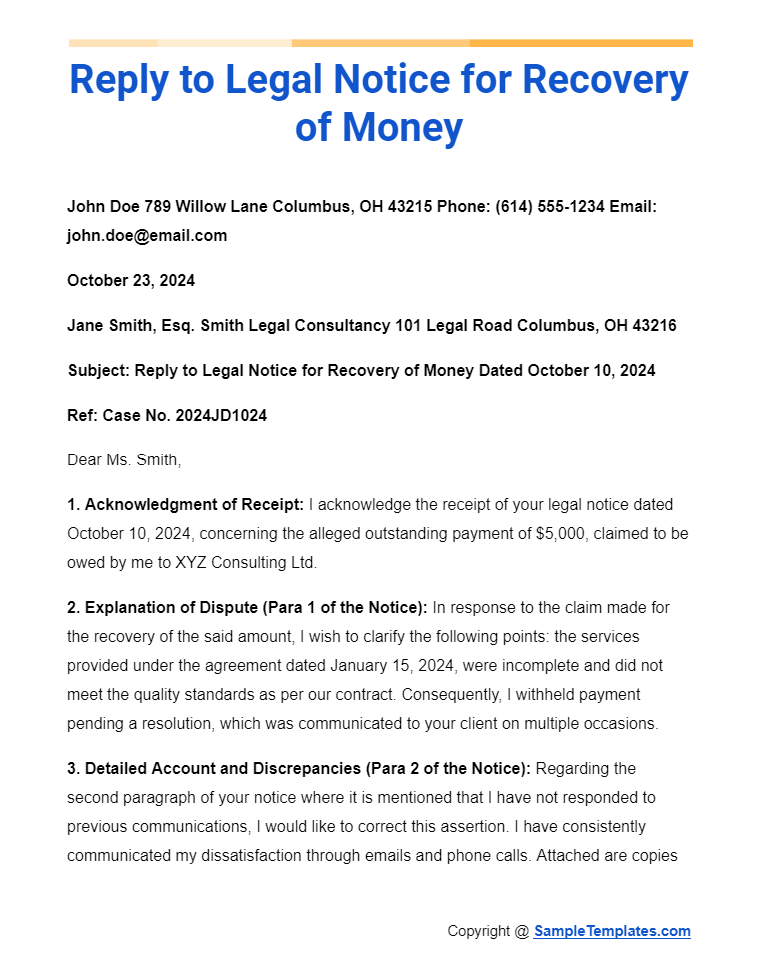
Reply to Legal Notice for Property Dispute
Michael Harris
342 Cedar Avenue
San Diego, CA 92101
Phone: (619) 555-4321
Email: [email protected]
October 23, 2024
Sarah Connor, Esq.
Connor & Associates Legal Services
9984 Broad Street
San Diego, CA 92103
Subject: Response to Legal Notice for Property Dispute Dated October 15, 2024
Ref: Case No. SD2024-9876
Dear Ms. Connor,
1. Acknowledgment of Receipt:
I acknowledge receipt of your legal notice dated October 15, 2024, concerning the alleged dispute over the property boundary at 840 Willow Road, San Diego, CA.
2. Background Information:
I have been the lawful owner of the property at 840 Willow Road since January 18, 2015, as documented in the deed registered under San Diego County, deed number CA8401. The claims of alleged boundary violation by your client, Mr. George Thompson, are not substantiated by the property surveys conducted before and after my purchase.
3. Dispute Specifics (Para 1 of the Notice):
The notice claims that I am responsible for the unauthorized alteration of the landscape which allegedly affects Mr. Thompson’s property drainage. However, these alterations were in accordance with the environmental guidelines and approved by the local city council, as evidenced by the approval documentation attached herein.
4. Proposed Resolution:
To resolve this matter without resorting to litigation, I propose that we arrange for a meeting with the city planning officers to review the approved plans and determine the necessary adjustments if required. This approach will ensure compliance with legal and environmental standards.
5. Request for Additional Documentation:
Please provide all relevant communications and complaints filed by Mr. Thompson with any local authorities regarding this issue. Having a comprehensive view of his grievances will aid in addressing them effectively.
6. Next Steps:
I suggest we schedule a mediation session within the next 30 days. I am open to weekdays after 3 PM. Please confirm a suitable date and time.
7. Legal Representation:
I have engaged the services of Ms. Linda Wright from Wright Legal Advisors for this matter. Please direct all further legal correspondence to her at [email protected].
Thank you for your cooperation, and I look forward to resolving this issue promptly and amicably.
Sincerely,
Michael Harris
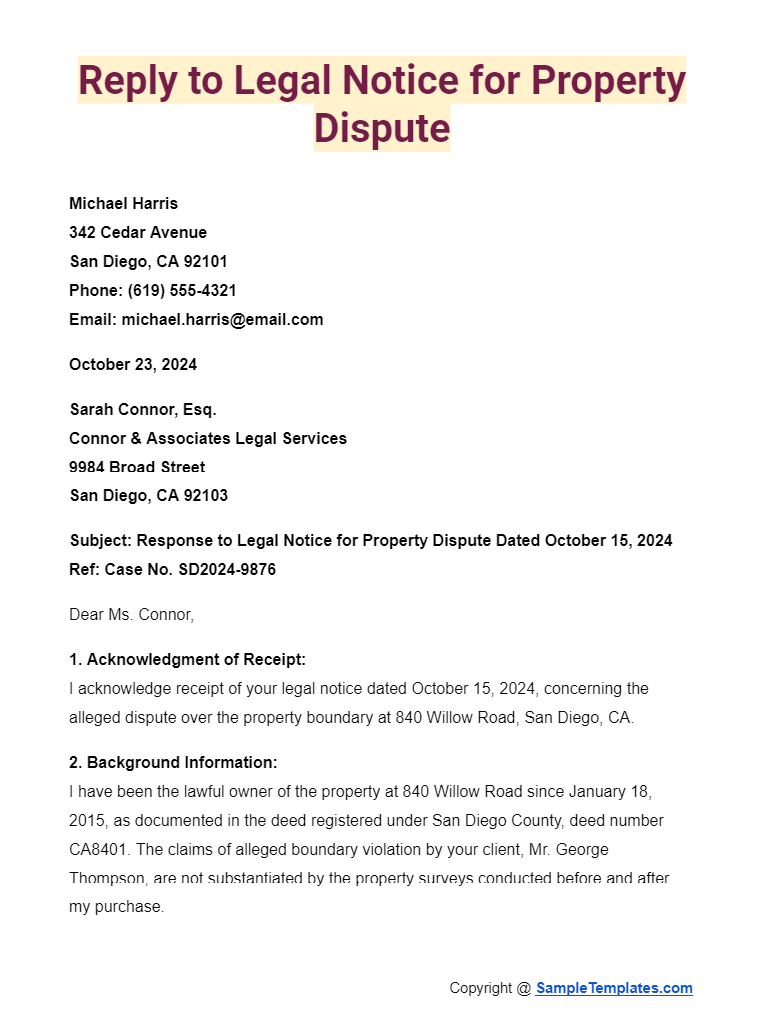
Reply to Legal Notice for Under Section 138
Alexander Green
123 Maple Drive
Seattle, WA 98101
Phone: (206) 555-0199
Email: [email protected]
October 23, 2024
Jennifer Lee, Esq.
Lee & Associates Legal Services
456 Pine Street
Seattle, WA 98105
Subject: Response to Legal Notice under Section 138 of the Negotiable Instruments Act Dated October 10, 2024
Ref: Cheque No. 00124578
Dear Ms. Lee,
1. Acknowledgment of Receipt:
I acknowledge the receipt of your legal notice dated October 10, 2024, which states that the cheque number 00124578, drawn on Bank of America, dated September 30, 2024, for the amount of $5,000, was returned unpaid.
2. Explanation and Background:
I regret any inconvenience caused by the dishonor of the cheque. This incident was not due to financial insufficiency but was a result of a clerical error in my bank’s processing system, which failed to record a deposit I made on September 28, 2024. I had communicated this issue to your client’s accounting department via email on October 1, 2024, expecting a resolution before the cheque was presented.
3. Current Resolution Steps:
Upon notification of the dishonored cheque from my bank, I acted promptly to ensure that the amount was settled. I have made a direct bank transfer in the full amount of $5,000 to your client’s account on October 12, 2024. Please find attached the bank transfer receipt as proof of this transaction.
4. Request for Withdrawal of Notice:
Considering that the full payment has been made, I kindly request the withdrawal of the legal notice and any proceedings that may have been initiated under Section 138 of the Negotiable Instruments Act.
5. Prevention of Future Issues:
To avoid such an occurrence in the future, I have arranged with my bank for more rigorous monitoring of my account and real-time transaction alerts. I am committed to ensuring that all future payments are processed smoothly and without delay.
6. Conclusion and Call for Confirmation:
I trust that the documentation provided and my swift action to rectify the situation will dispel any concerns regarding my commitment to fulfilling my financial obligations. Please confirm the receipt of the payment and the withdrawal of the notice at your earliest convenience.
Thank you for your understanding and cooperation. I look forward to your confirmation that this matter has been satisfactorily resolved.
Sincerely,
Alexander Green
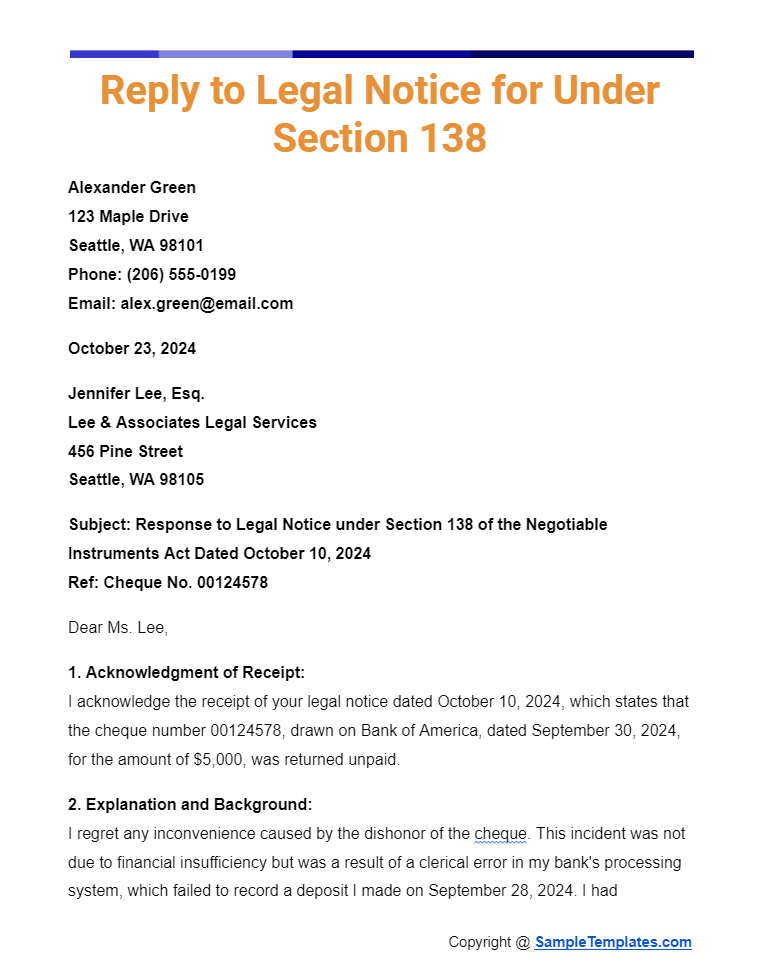
Browse More Templates On Reply to Legal Notices
1. Sample Reply to Legal Notice
What is a Reply to Legal Notice?
Before you tackle on how to handle a legal notice, it’s optimal first to understand what you’re responding to. By definition, a legal notice serves as a tool within a contract agreement that serves to remind the other party of their duties and obligations. In other words, this document tears down any chance of “Argumentum Ad Ignorantiam” or appeal to ignorance. These documents are found in any business setting and come in various layouts and purposes, with a few examples being construction notices, notices of termination, and restraining orders.
Now, while some of the examples mentioned above merely inform, some legal notices require a response. Documents such as court orders or lease notifications that request for explanations often state a set amount of time and a deadline for submission before executing heavy penalties. Now, in these instances, it’s best to provide a reply to the legal notice to defend your side of the transaction or accusation.
“Who Summoneth Thee?”
Harry Potter isn’t the only person able to summon objects with powerful spells; judges also know how to convoke people to court using just sheets of paper and an official seal. In fact, the most common use of a reply to legal notice document is to respond to a court summon. However, not many people know the intricacies of these documents. A court summons requires an individual or a representative of a corporation to be present at a hearing. These notices are used both by the civil and criminal court, and range from a simple jury summons, to a call to defend allegations on your part. More often than not, when you receive an order to appear, it means that someone is filing a case against you.
A question many people ask is, “what happens if you don’t reply to a legal notice?” It depends on the gravity of the fault and the context of the document. If, for example, you failed to reply to a jury summon (i.e., you ignored the notice letter), you’ll most likely receive a bench warrant. However, for something as grave as a case in criminal court, it means possibly losing your case, gaining additional charges, and multiple fines. Hence, your best interest is to reply to a legal notice and inform the judge of your response.
2. Lawyer Response to Allegations
What is the Right Way to Respond to a Legal Notice?
- Read Carefully: Understand the contents and the allegations or claims made in the legal notice. Note any deadlines and specific legal terms or conditions mentioned.
- Preserve the Notice: Keep the original document and any envelope or packaging that came with it, as these may be important if the matter escalates to legal proceedings.
- Consult a Lawyer: Before responding, consult with a lawyer who specializes in the relevant area of law. Legal advice is crucial to understand the implications of the notice and to formulate an appropriate response strategy.
- Gather Evidence: Collect all documents, correspondence, contracts, agreements, and any other evidence that can support your position or refute any false claims made in the notice.
- Draft a Formal Response: Write a formal reply to the legal notice. Your response should be clear, concise, and directly address each point raised in the notice. Be factual and avoid emotional language.
- Reply within the Deadline: It’s important to adhere to any deadlines specified in the notice for your response. Failing to reply on time could be construed against you in further proceedings.
- Keep Copies: Make copies of the legal notice and your response. Keep a record of all communications and documents exchanged between the parties involved in the dispute.
- Consider Settlement Options: If applicable, consider whether it might be beneficial to propose a settlement or mediation to resolve the dispute out of court. Often, settlements can be less costly and less time-consuming than formal litigation.
3. Notice of Response and Affidavit in Support
4. Reply to Third Party Sample Notice
Types of Legal Notice
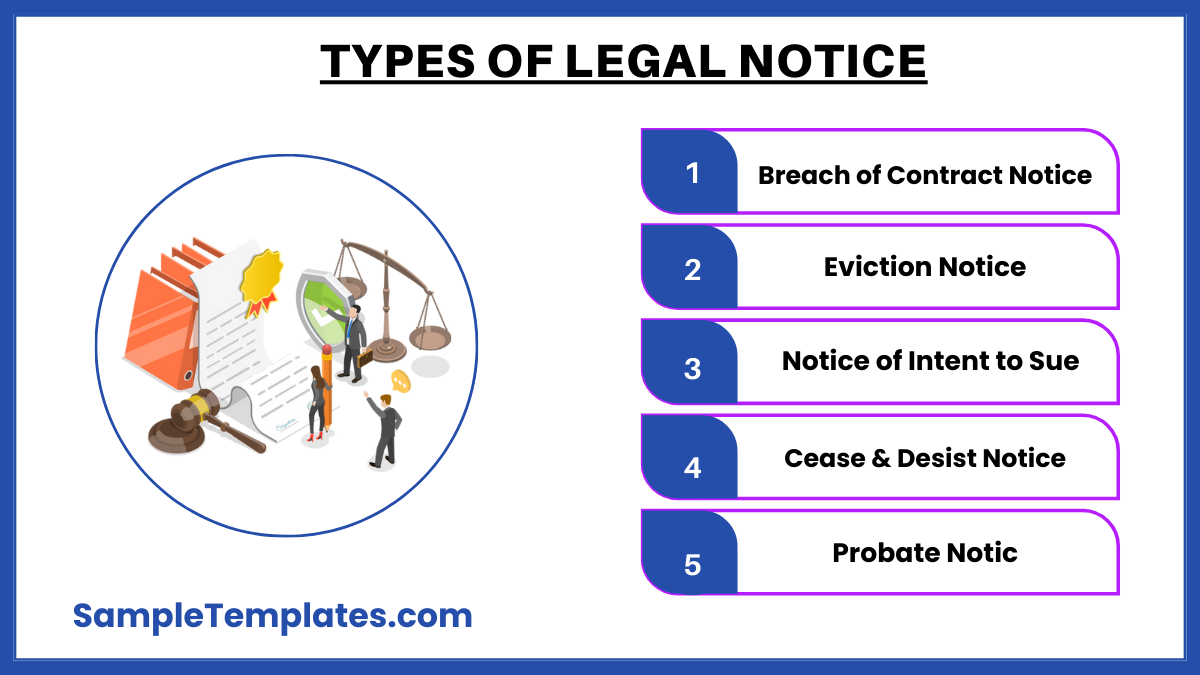
- Notice of Breach of Contract: This type of notice is issued when one party believes another has failed to fulfill their obligations under a contract. It specifies the nature of the breach, the specific contractual terms involved, and often provides a deadline for rectifying the breach before further legal action is taken.
- Eviction Notice: Landlords issue eviction notices to tenants for various reasons, such as non-payment of rent, violation of lease terms, or the expiration of a lease. These notices must adhere to local laws regarding eviction and usually provide a set period for the tenant to respond or vacate the property.
- Notice of Intent to Sue: Often used in personal injury, employment, or other civil disputes, this notice informs the recipient that the sender intends to file a lawsuit against them. It typically outlines the basis for the future lawsuit and may invite the recipient to settle the matter before formal litigation begins.
- Cease and Desist Notice: This is issued when one party wishes another to stop alleged illegal activities. The notice describes the alleged misconduct, explains why it is unlawful, and demands that the activity be ceased immediately to avoid further legal action.
- Probate Notice: Used in the context of wills and estates, this legal notice is sent to potential heirs, creditors, and other interested parties. It informs them of the death of an individual and the initiation of probate proceedings to distribute the deceased’s assets. It may also announce the need to submit claims against the estate by a specified deadline.
5. Reply to Legal Notice in Service Matters
6. Response to Defamation Notice Sample
How to Create a Reply to Legal Notice Document?
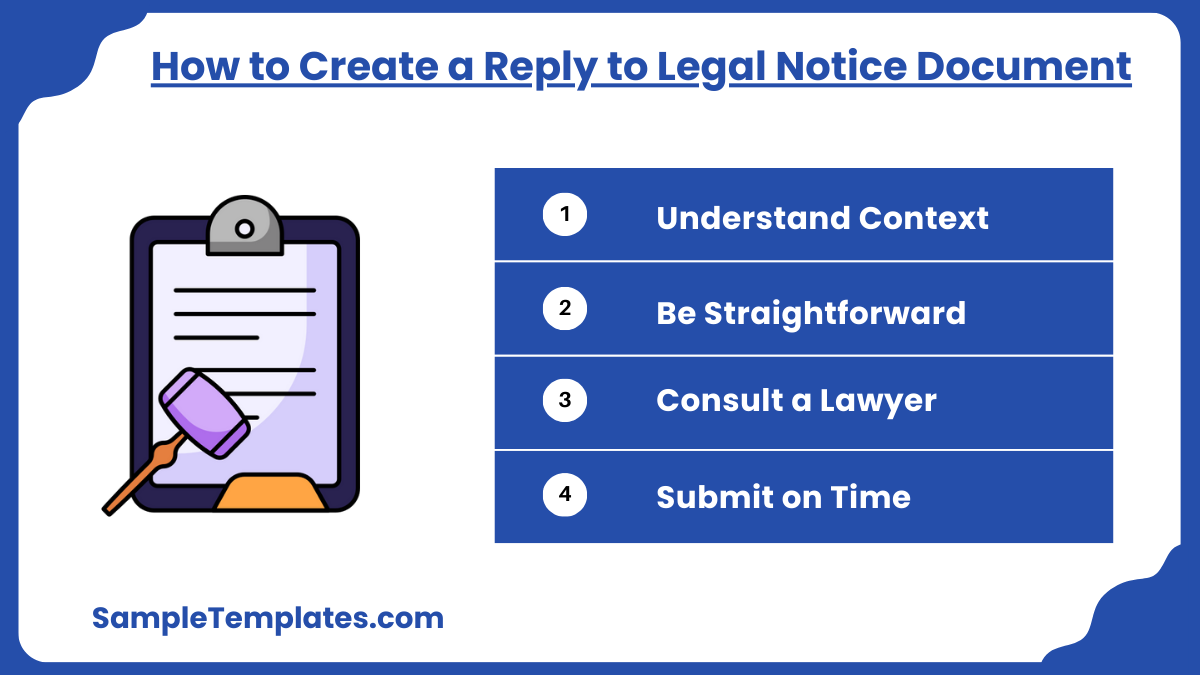
Wouldn’t it be much easier if all you had to do to write a reply to legal notice is fire up a lightbulb above your head and let ideas gush in like an unclogged stream? Unfortunately—as any writer knows—this isn’t always the case. Time and time again, you will find yourself filling up your trash bin with crumpled balls of paper and wetting your eyes with tears of despair and regret. However, despite its regal appearance and sophisticated structure, it’s still just words on paper. Hence, here are a few tips and tricks you can use to lighten your load and guide you in drafting this challenging document.
1. Context Comprehension is Vital
As mentioned a few paragraphs above, legal notices have various purposes and a multitude of implications. These innuendos range from eviction notices to demand letters, and each can have variations in the text. With that said, whether it’s a small-court case, criminal case, or particular means of compensation, understanding the “context of your text,” so to speak, is vital to providing an adequate reply, rebuttal, or explanation.
2. Be Straightforward
If you aren’t out on the street distributing promotional brochures and continuously praising an entity, there’s no need to beat a dead horse. When writing your text, directly address your issue or claim since this is what the judge will home-in on. However, going straight to the point doesn’t have to be done in an aggressive tone as it is advised to stay amicable in your approach to prevent further hostility.
3. Consult a Lawyer
Think of it this way; if you were asked to list down any faults within a legal document, and you were up against somebody who’s studied the law for at least fourteen years, chances are you’d lose. Lawyers are trained to criticize contract agreements, check for loopholes, and outplay their opponents with the use of the constitution; if anyone is qualified to help you draft your reply to legal notice, it’s them.
4. Submit Within the Given Timeframe
While this isn’t true for all of them, most notices specify a submission timeline. Usually, it’s something along the lines of “… With that said, you’re given a 30-day period to respond to this notice. Otherwise, you risk incurring heavy penalties.” With that said, make sure you submit your reply to the legal notice within the given period to avoid further complications and for professionalism’s sake.
Legal notices are no laughing matter and ignorance of them will lead to various lawsuits, jail time, and various fines. Properly addressing them is crucial to avoiding the unfortunate consequences of “deaf ears,” so to speak. With that said, when creating a reply for any legal notice you receive, it’s best to keep everything professional, amicable, and non-aggressive. After all, you don’t win court cases by boiling your accusers in their own anger, but through a more well-rounded and calculated approach.
Related Posts
FREE 10+ Notice of Intent to Vacate Samples in PDF
FREE 10+ Notice to Proceed Samples in PDF
FREE 10+ Violation Notice Samples in PDF
FREE 10+ Price Increase Notice Samples in PDF
FREE 10+ Past Due Notice Samples in PDF
FREE 12+ Legal Notice Samples in MS Word | Pages | Google Docs | PDF
FREE 10+ Health Insurance Exchange Notice Samples in PDF | DOC
FREE 10+ Meeting Notice Samples & Templates in Google Docs | MS Word | Apple Pages
FREE 10+ Employee Return to Work Samples in PDF | DOC
FREE 10+ Notice of Return to Work Samples [ Leave, Ability, Intent ]
FREE 9+ Sample Notice Agreement Templates in PDF
FREE 10+ Retail Notice Samples in PDF | MS Word
FREE 12+ Contractor Notice Samples in PDF | MS Word | Excel
FREE Why Is Notice of Copyright Important? [ Importance, Purpose, Elements, Advantages ]
FREE 11+ Rent Notice Samples & Templates in PDF | Google Docs | MS Word | Apple Pages
